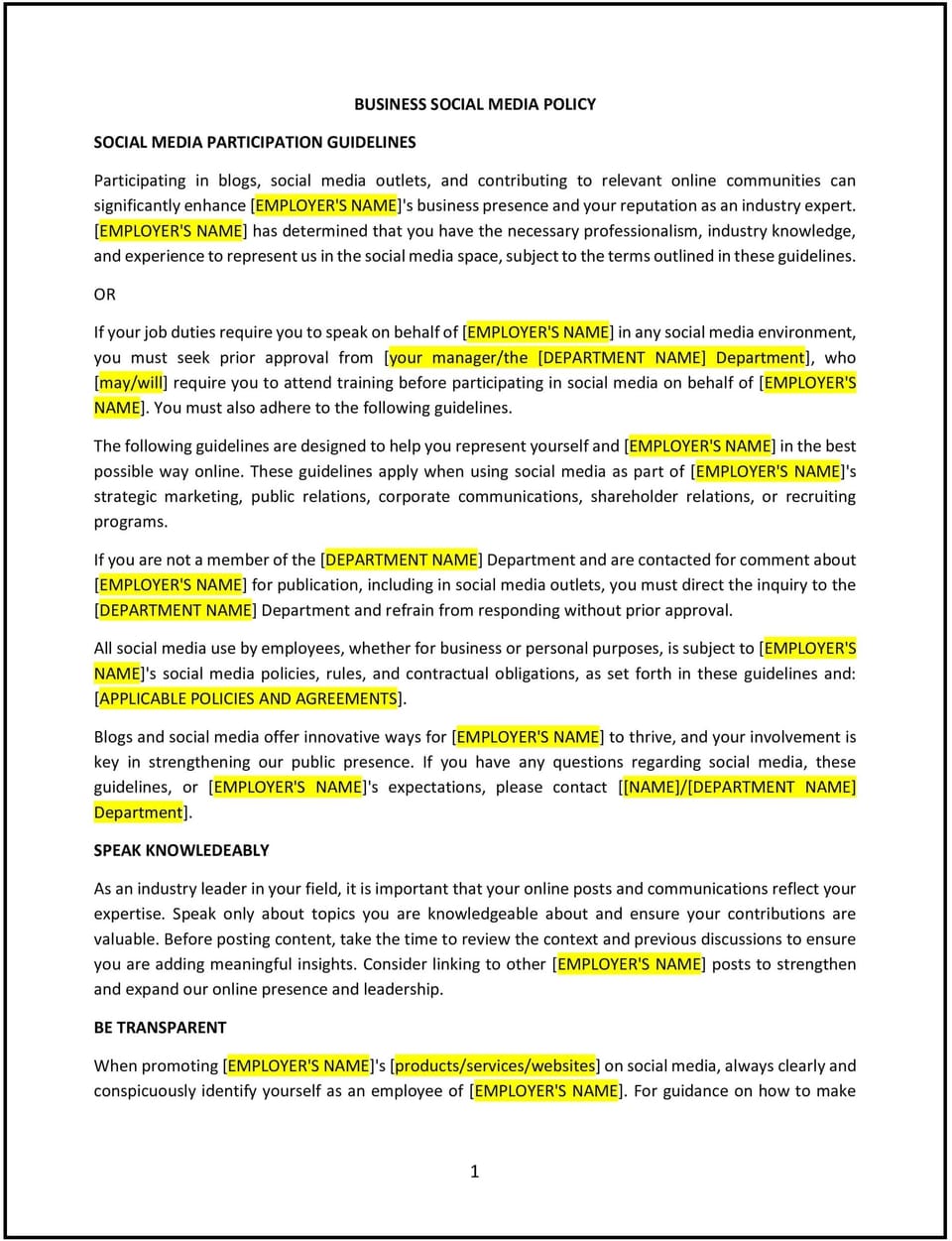Business social media policy (Alaska): Free template

Business social media policy (Alaska)
In Alaska, a business social media policy helps organizations establish guidelines for employees' use of social media, both professionally and personally, to protect the company’s reputation and ensure compliance with relevant regulations. This policy addresses acceptable usage, confidentiality, and the potential impact of online behavior on the organization’s operations. By implementing a clear social media policy, businesses can support compliance while fostering responsible and respectful communication.
Alaska’s unique industries, such as tourism, fishing, and oil, often rely heavily on public perception and trust. A well-structured social media policy helps businesses manage these dynamics by providing employees with clear expectations regarding online conduct and the representation of the company.
How to use this business social media policy (Alaska)
- Define acceptable use: Clearly state what constitutes appropriate and inappropriate social media usage during work hours and when referencing the company. This includes outlining the types of content employees are permitted to share.
- Address confidentiality: Emphasize the importance of protecting sensitive company information and ensure employees understand the consequences of sharing proprietary or confidential details online.
- Provide guidance on personal accounts: Clarify how employees can mention the company on their personal social media accounts and what disclaimers may be required to distinguish personal views from the company’s stance.
- Promote respectful behavior: Include guidelines on maintaining professionalism and refraining from discriminatory, harassing, or offensive content, especially when interacting with coworkers or clients online.
- Establish monitoring and enforcement: Specify whether and how the company will monitor social media usage and the potential disciplinary actions for violations of the policy.
Benefits of using a business social media policy (Alaska)
A business social media policy provides several advantages for businesses in Alaska. Here’s how it helps:
- Protects the company’s reputation: Ensures employees understand their role in maintaining a positive public image for the organization.
- Supports compliance: Provides clear rules for adhering to industry-specific and general regulations regarding online communication and confidentiality.
- Reduces legal risks: Minimizes exposure to potential legal issues, such as defamation, privacy violations, or breaches of confidentiality.
- Promotes professionalism: Encourages employees to maintain respectful and professional behavior online, enhancing internal and external relationships.
- Provides clarity: Prevents misunderstandings by clearly outlining expectations and acceptable practices for social media use.
Tips for using a business social media policy (Alaska)
- Tailor to your industry: Customize the policy to reflect specific risks and expectations relevant to your business sector, such as client confidentiality in legal services or tourism promotions.
- Encourage transparency: Ensure employees understand how the policy applies to both professional and personal social media use.
- Provide training: Educate employees on best practices for using social media responsibly, including how to handle conflicts or address negative comments.
- Review regularly: Update the policy as needed to reflect changes in social media platforms, company goals, or legal requirements.
- Clarify boundaries: Clearly outline when and how employees are allowed to use social media during work hours, especially for personal purposes.
Q: Can employees mention my company on their personal social media accounts?
A: Employees can mention your company, but they should include a disclaimer stating that their opinions are personal and not representative of the company’s official stance.
Q: What happens if an employee shares confidential information online?
A: Sharing confidential information may result in disciplinary action as outlined in the policy, which could include termination depending on the severity of the violation.
Q: Can my company monitor employees’ social media activity?
A: The policy should specify the extent to which the company monitors social media usage and ensure it complies with privacy laws.
Q: Are employees allowed to use social media during work hours?
A: Limited personal use may be permitted, but work-related activities should take priority. Specific guidelines should be included in the policy.
Q: How does this policy support compliance with legal standards?
A: By providing clear rules for social media use, the policy helps reduce the risk of defamation, confidentiality breaches, or other legal issues that could arise from improper online behavior.
This article contains general legal information and does not contain legal advice. Cobrief is not a law firm or a substitute for an attorney or law firm. The law is complex and changes often. For legal advice, please ask a lawyer.


